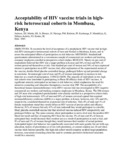| dc.description.abstract | OBJECTIVES:
To ascertain the level of acceptance of a prophylactic HIV vaccine trial in high-risk HIV-seronegative heterosexual cohorts of men and women in Mombasa, Kenya, and to assess the anticipated effects of participation on risk behavior.
METHODS:
Standardized questionnaire administered to a convenience sample of commercial sex workers and trucking company employees enrolled in prospective cohort studies.
RESULTS:
Ninety-six per cent of respondents believed that HIV was a major problem in Kenya and 86% of men and 94% of women perceived themselves at risk. One hundred per cent of women and 84% of men expressed interest in participation in an HIV vaccine trial, after explanation of the experimental nature of the vaccine, double-blind placebo-controlled design, prolonged follow-up and potential change in serostatus. Seventeen per cent of men and 9% of women anticipated an increase in risk behavior as a result of participation.
CONCLUSION:
The majority of individuals in two high-risk cohorts were interested in participating in Phase III efficacy trials of HIV vaccines. A significant minority anticipated an increase in risk behavior, which emphasizes the need for intensive counseling and education throughout a vaccine trial.
PIP:
The acceptability of a theoretical human immunodeficiency virus (HIV) vaccine trial was investigated in HIV-negative commercial sex workers and trucking company employees in Mombasa, Kenya. The 206 women and 201 men who completed questionnaires were already enrolled in a prospective cohort study of high-risk heterosexuals. 95% of men and 98% of women surveyed agreed that acquired immunodeficiency syndrome (AIDS) is a major problem in Kenya; however, only 14% and 6%, respectively, considered themselves at personal risk of infection. Only 4% of male and 1% of female respondents stated they would refuse an HIV vaccine of proven safety and efficacy. However, 91% of women but only 67% of men indicated they would participate in a double-blind, placebo-controlled vaccine trial that involved vaccine-induced HIV seropositivity and prolonged follow-up. The main concerns about participation in such a trial were the positive HIV blood test result and fear of acquiring HIV from the vaccine. 9% of men and 6% of women anticipated they would decrease their condom use as a result of participation in such a trial, and 9% of men and 3% of women thought they would increase their number of sexual partners. Anticipated higher risk behavior was significantly associated with male gender, but not with age, education, history of prostitution or of sex with prostitutes, or current condom use. If and when vaccine trials become possible, this high-risk cohort would comprise an ideal target population; however, concurrent counseling about the need to continue preventive behavioral measures would be a necessity. | en |

